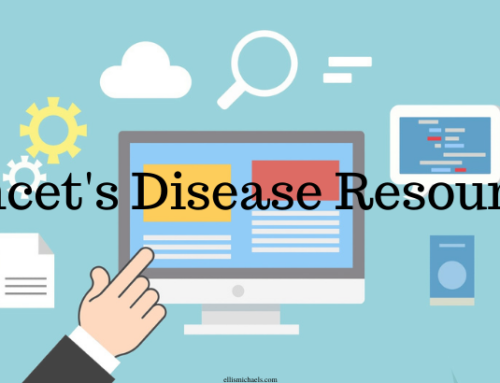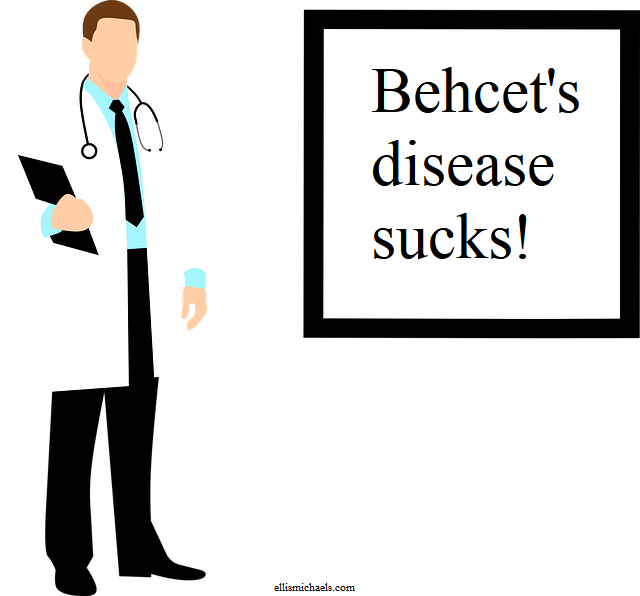You got the news. The doctor came in and told you that you have Behcet’s disease – a rare, chronic illness. You’re overwhelmed with emotion, a strange mix of feelings that contain everything from joy to sadness, excitement to grief. But where do you go from here?
This article is for those of you who have recently been diagnosed with Behcet’s disease (or any chronic illness, really). Getting diagnosed can be terrifying, relieving, and even liberating all at the same time. But getting diagnosed is only the beginning.
So, what are you supposed to do after you’ve been diagnosed with Behcet’s? That’s what we’re going to talk about today.
So, You’ve Been Diagnosed With Behcet’s Disease. Now What?
Table of Contents
No two cases of Behcet’s disease are the exactly the same. And of course no two people are the same. So reactions to getting diagnosed will be highly individualized. However, there are some things that everyone goes through. And one of those things is grief.
Good Grief
 When you lose someone you care about, you go through a period of mourning. But you also go through the grieving process after being diagnosed with a rare and chronic illness. The only difference is that it’s not the loss of someone else you’re mourning – the person you’re mourning the loss of is you.
When you lose someone you care about, you go through a period of mourning. But you also go through the grieving process after being diagnosed with a rare and chronic illness. The only difference is that it’s not the loss of someone else you’re mourning – the person you’re mourning the loss of is you.
You have dreams for yourself. Goals. Plans. You’ve got a whole life planned out in your head. But when you’re diagnosed with a chronic disease, those plans often come crashing down. You realize that life isn’t going to turn out the way you’d wanted and the grieving process begins.
What you’re mourning is the loss of the life you could’ve lived. You’re grieving over the loss of the healthy life you’d always pictured yourself having. Now that you’ve been diagnosed with a chronic illness, you realize that your future isn’t going to turn out the way you wanted it to.
In 1969, after working with terminally ill patients, a psychiatrist named Elisabeth Kubler-Ross came up with what has become known as the Five Stages of Grief (sometimes called the Kubler-Ross method). She noticed that people in mourning seem to go through the same five stages:
- Denial
- Anger
- Bargaining
- Depression
- Acceptance
When you’re first diagnosed with Behcet’s disease or any chronic illness, you’ll likely go through at least some of these stages. I know I went through all of them. The depression and denial stages were especially strong. But eventually I got to acceptance and so will you.
Let yourself mourn. Let all of the emotions stirring around inside you out. It’s okay. It’s perfectly normal. Grieve. Cry. Yell. Punch something. Eat a wheelbarrow full of ice cream. Do whatever you have to do to mourn the loss of the healthy future you were expecting to live. The sooner you do, the sooner you’ll learn to accept your situation so you can start moving forward.
Get Educated

Me as a teenager.
When I was first diagnosed with Behcet’s, I was still a teenager and got trapped in the denial phase for years. I didn’t want to believe I had a serious, lifelong illness. As it turned out, I was also suffering from another condition: ostrich syndrome. In spite of everything happening to my body, I stuck my head in the sand and pretended everything was fine.
But everything wasn’t fine. My body was attacking itself for no reason and ignoring it wasn’t going to make it stop. Both of my parents were nurses and they tried to learn as much about my diagnosis as they could. But when my parents and my doctors tried to educate me, I didn’t want to hear it.
Don’t be like me: don’t be an ostrich.
Get educated. After being diagnosed with Behcet’s disease or any chronic illness, it’s the single best thing you can do. Learn as much as you can about what’s happening inside your body, why it’s happening, and what you can do about it. Read about others with Behcet’s to learn from their stories.
But don’t stop there. You should also get familiar with the medical system and how it works. Learn about what doctors to see for what symptoms, how to deal with Health Maintenance Organizations (HMOs) and other types of health insurance, how to save money on prescriptions, and everything else.
 Unless you have a background in medicine, it can be overwhelming. There’s a lot to take in. But if you want to live the best life possible, you’re going to have to learn as much as you can about your illness. Take it slowly if you have to. But the sooner you start educating yourself, the better off you’ll be.
Unless you have a background in medicine, it can be overwhelming. There’s a lot to take in. But if you want to live the best life possible, you’re going to have to learn as much as you can about your illness. Take it slowly if you have to. But the sooner you start educating yourself, the better off you’ll be.
When I was diagnosed with Behcet’s in 1997, few resources were available. There were a couple hard-to-find books about Behcet’s disease, but that’s about it. The American Behcet’s Disease Association existed, but they didn’t have a website, Facebook page, or any easy way to discover them. In other words, even if I’d wanted to get educated about Behcet’s back then, it would’ve been nearly impossible.
Today, dozens of great resources exist. I’m not going to go into a lot of detail about them in this article because you can read about them here: Behcet’s Disease Resources. But there are dozens of books about Behcet’s disease (including this awesome memoir – wink, wink), Facebook groups, a Reddit forum, several podcasts, and more.
Behcet's Disease Uncensored (BDU) is a podcast to discuss this rare illness.
Behcet's doesn't censor itself when it attacks our bodies. So why should we censor ourselves when discussing it?
Listen to BDU on Spotify or wherever you listen to podcasts.
Get Organized
If you’re all over the place just kind of living day to day, moment to moment, there’s nothing wrong with that. But if you’ve recently been diagnosed with a rare and chronic illness like Behcet’s disease, you need to get organized – a little bit, at least.
 The first thing you need to organize is your appointments. Depending on your individual situation, you may have to see several healthcare providers. The year I was diagnosed, I saw my pediatrician and primary care physician (PCP), two ophthalmologists, a dermatologist, a rheumatologist, a hematologist, and an orthopedic surgeon. For a while there, I had at least one-or-two appointments every week for months.
The first thing you need to organize is your appointments. Depending on your individual situation, you may have to see several healthcare providers. The year I was diagnosed, I saw my pediatrician and primary care physician (PCP), two ophthalmologists, a dermatologist, a rheumatologist, a hematologist, and an orthopedic surgeon. For a while there, I had at least one-or-two appointments every week for months.
Hopefully, you won’t have to see as many doctors as I did. But whether you only have to see one-or-two or you have a whole team of specialists you’re lined up to see, you need to get organized. It doesn’t take much time and it’ll help a lot.
The best thing to do is use a calendar. It doesn’t matter if it’s an actual calendar hanging on your refrigerator or a calendar app on your phone. But you need to have one place where you keep track of all your upcoming appointments.
I used to use a pocket-sized calendar book to keep track of mine. But in recent years, I’ve switched to using the calendar app on my phone. Whenever I make a new appointment, it immediately goes in my phone. That way I can totally forget about it until my phone reminds me it’s coming up.
Another thing you need to organize is your medication schedule. If you’ve been diagnosed with Behcet’s, odds are you’ve been prescribed at least one-or-two drugs – possibly many more. You need to create an easy-to-follow schedule for taking your meds that you can stick to.
It’s all about coming up with a routine that works for you – routine being the operative word. You want to work it into your schedule in such a way that it becomes automatic over time.
For the past several years, I’ve been on the same medications. I take them at the exact same time every day: morning meds with breakfast, night meds right before I lay down to sleep. My medication schedule is so ingrained in my daily routine I don’t even have to think about it. It just happens automatically.
That’s what you should aim for. Organize your medication schedule in such a way that you take them at the same time during the same activity everyday. If you do, you’ll never find yourself asking questions like, “Did I take my AM meds?” With a little organization, you can avoid ever having to worry about stuff like that.
Another thing I’d recommend doing if you’re able to is keep a journal. I’m not talking about a tell-all diary where you confess your most embarrassing secrets. I mean a Behcet’s-disease-specific journal. It can be as simple or as detailed as you’d like. The important thing is to have a record of your symptoms for future reference.
Even just jotting down a few notes everyday can be incredibly helpful. An entry might read something like this:
2/23/2021 – Woke up with slight headache. Joints hurt more than usual. 400 mg of ibuprofen helped a little bit.
It doesn’t have to be complicated. Even just a few words is fine. But those few words might help you and your doctor figure out ways to improve your condition. And it doesn’t have to be with pen and paper. Feel free to use your phone, tablet, laptop, or whatever electronic device you’re most comfortable with.
Lastly, if you’re on a number of medications, it can be a good idea to keep a list of those meds. That way when you go to see a doctor and s/he asks for a list of current medications, you don’t have to worry about forgetting any or getting the dosages wrong. It’s also a good idea to keep a list of meds you’ve been on in the past, what they were for, how they worked, and why you stopped taking them. To include in your medication list:
 Name of medication (Brand and/or generic name)
Name of medication (Brand and/or generic name)- Dosage
- Directions
- When the med was started (and stopped if it’s been discontinued)
- Any positive effects
- Any noticeable side effects
Since brain fog and fatigue often go hand-in-hand with Behcet’s disease, it might not always be easy to stay organized. Just do the best you can.
Connect
When you first get diagnosed with Behcet’s disease or any rare and chronic illness, it’s natural to go through bouts of extreme loneliness. It’s likely no one in your life has gone through what you’re going through and you feel incredibly alone. You feel like nobody understands – like nobody can possibly understand, even if they tried to.
I was diagnosed with Behcet’s in a pre-internet world. Technically the internet existed, but it wasn’t the social-networking superpower it is today. I didn’t have access to all the wonderful Facebook groups, message boards, and other communities I do now. I can’t help but wonder how differently I would’ve felt if those things existed back then. There were times when I felt like the only person on the planet with Behcet’s disease. I’m sure having people to connect with would’ve made me feel a lot less lonely.
 Online social networks didn’t really exist when I was diagnosed, but they do now. Use them. Join a Facebook group for people living with Behcet’s or for people with chronic illnesses in general. There are groups out there for just about every diagnosis, no matter how rare.
Online social networks didn’t really exist when I was diagnosed, but they do now. Use them. Join a Facebook group for people living with Behcet’s or for people with chronic illnesses in general. There are groups out there for just about every diagnosis, no matter how rare.
Don’t be afraid to reach out. Connect with others who have gone or are currently going through the same thing as you. Find people you can talk about your symptoms with. Find people who know firsthand how much it sucks to have Behcet’s. Not only will it make you feel less lonely, you’ll likely make some new friends in the process.
For years, I felt like the only person on the planet with Behcet’s disease. I’d never met anyone else with the diagnosis. Even my rheumatologist, a doctor who specializes in autoimmune diseases like Behcet’s, told me I’m only one of two patients he’d ever seen with it.
But once I discovered and joined online communities of people with the same diagnosis, my feelings changed. No longer did I feel so alone. In fact, over time, I started to feel like I was a part of a community. And I’ve made some very meaningful friendships with people I never would’ve met otherwise.
Connect with others who have Behcet’s disease. In this day and age, you have a choice that I didn’t when I was diagnosed. I had no choice but to feel lonely. You do have a choice. So get out there and meet some other people with Behcet’s you can relate to.
Conclusion
Getting diagnosed with Behcet’s disease – or any chronic illness – can be great and horrible at the same time. On the one hand, it’s nice to finally know the name of what’s been causing your symptoms. But at the same time, it’s difficult to hear that you’ll be living with a disease for the rest of your life.
After you get diagnosed with Behcet’s disease, it can be hard to know what to do. Hopefully this article has given you at least some guidance. I know I certainly could have used this information when I was diagnosed. The hard way was the only way for me to learn, but it doesn’t have to be for you.
To learn more about Behcet’s disease, check out some of the other blog posts I’ve written about it that I’ll list below. And if you’d like to hear all the dirty, dark details of my Behcet’s story, I wrote a book about it: Finding Happiness Through Pain and Embarrassment: My Life With Behcet’s Disease – A Memoir.
- What Is It Like Having Behcet’s Disease?
- Who Is Behcet’s Disease Named After?
- Behcet’s Disease and Mental Illness
- 5 Home Remedies For Behcet’s Disease
- Cannabis and Behcet’s Disease
- 5 Silver Linings Of Having An Autoimmune Disease
Join the Ellis Michaels mailing list to get notified about new Behcet's disease articles and publications, up-to-date news and info about this rare illness, and more.








Leave a Reply